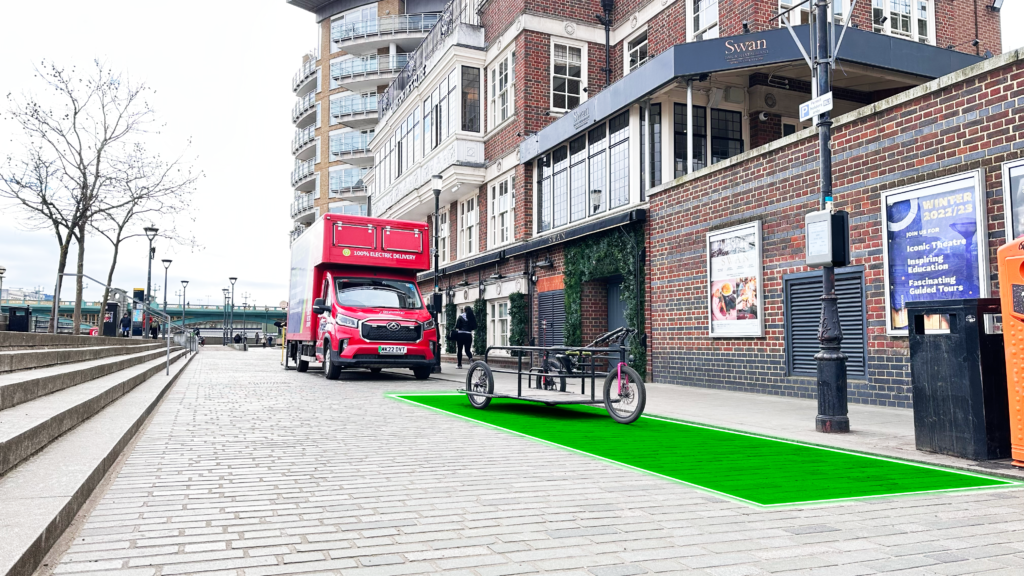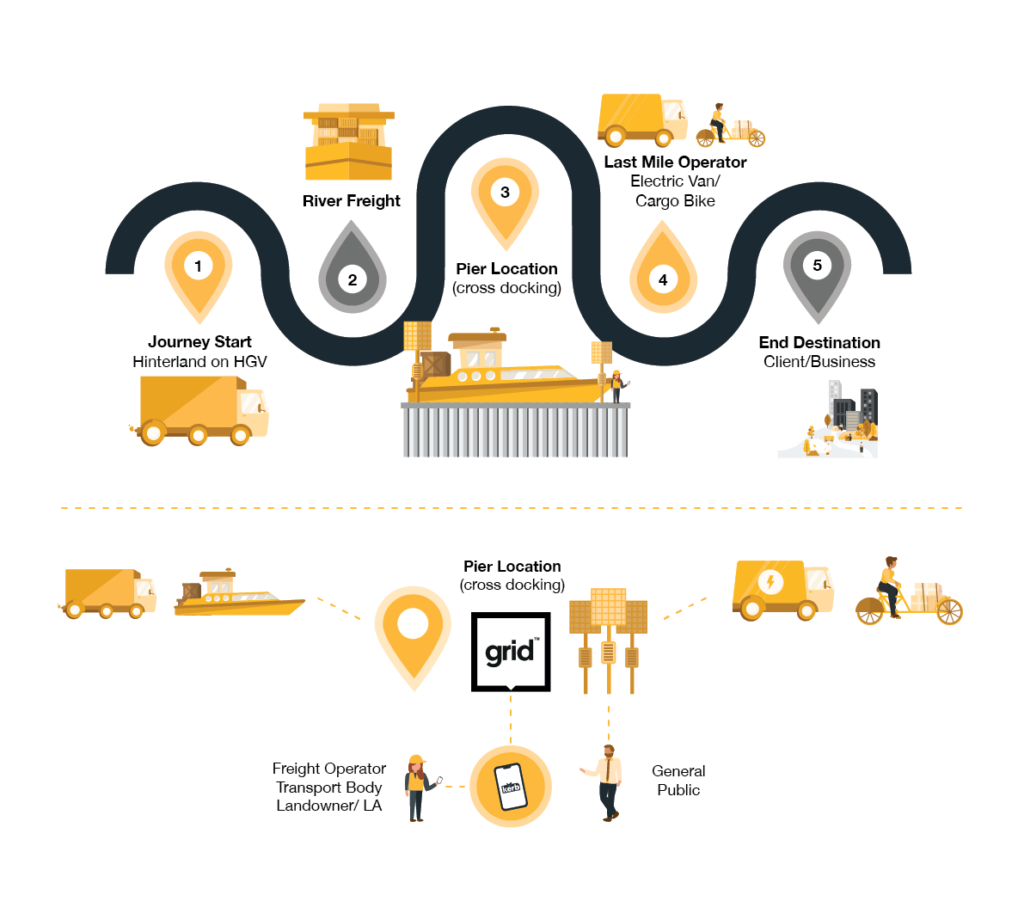London’s first river-road scheme which included dedicated space at the kerbside for cross-docking freight came to a successful conclusion earlier this month. The two bookable bays were created on Bankside adjacent to Bankside Pier for the use of freight, servicing & delivery drivers.
Following the completion of the project, an evaluation report has been produced which makes a series of practical, evidence-based recommendations. The research, led by transport consultancy Steer, lays out an action plan for future river-road cross-docking freight deployments in London and other major cities, providing a blueprint for how cross-docking can be used to enable sustainable city growth.
The key recommendations for the implementation of a successful river-road cross-docking freight scheme are noted below:
1. Policy and planning
Strong policy & planning, such as safeguarding of wharves, is required. This together with long-term strategic coordination will be required to enable river freight to scale.
2. Managing River Freight Locations
Existing low levels of light river freight can be accommodated on passenger piers. To successfully grow & scale river freight solutions, larger and better managed spaces will be required.
3. Operator Perspective
Operators found the booking and safety of having dedicated cross-docking spaces to be useful. If used in combination with recommendations 1 & 2 it would be easier for the operators to invest and expand their river operations.
4. Local Monitoring and Engagement
Monitoring all transport modes to provide data and accurately attribute any peaks in noise or air quality breaches was crucial. Showcasing that data can be used and shared to track cross-docking freight activity and new delivery modes did not negatively impact the local community.

Image of the bookable bays outside of The Swan in Bankside, Southwark
A New River Freight Proposition for Cleaner Freight in London
Impact on Urban Health funded this innovative project to explore how a multimodal approach to freight could support a cleaner urban environment for the communities of London. Grid worked on this project alongside a mix of multidisciplinary stakeholders and in association with Southwark Council.
Watch a video on how the cross-docking journey works here:
Ben Pearce, Portfolio Manager at Impact on Urban Health said:
“Air pollution devastates people’s health in urban areas like London. Freight – the movement of goods across cities – is a major contributor to air pollution.
This project was designed to test whether we can be making better use of the river for deliveries, reducing the need for polluting vans. The results are practical, evidence-based recommendations to enable local government, freight operators and landowners to scale up the use of river freight.”
Effective Stakeholder Management Contributed to the Depth and Diversity of the Project’s Insight-driven Outcomes
Working in collaboration with Impact on Urban Health, Southwark Borough Council, and in association with project partners Steer, EMSOL and MP Smarter Travel; the Kerb-Dock project ensured a range of diverse perspectives, expertise, and experiences were inclusively incorporated into the research outcomes.
Laura Jacklin, Commercial Development at Grid Smarter Cities said:
“Kerb-Dock has shown the necessity of managing space on cross docking activities to sustainably scale up river freight. Technology has a part to play where platforms such as Kerb can help to showcase the real-time information on deliveries at spaces where cross docking is important.
The biggest success of the project has been getting all the stakeholders who are involved in this process into the room to discuss how it can be done together.“
For more information read the executive summary or download the full report
The two bookable loading bays near Bankside Pier are still live and can be used by approved couriers delivering in the area. Interested operators can sign up to be able to use these bays free of charge.
Contact kerbdock@gridsmartercities.com for application and enquiries.
Notes on the scheme:
Kerb-Dock – bringing river, road and greener last mile together
The advanced booking technology for the bays is hosted on Grid’s innovative Kerb platform. This enabled the river to be combined with greener last mile modes such as walking or cargo bikes for the onward delivery of light freight goods.

Grid’s kerbside booking platform enabled freight operators to book loading and unloading space adjacent to river docking.
London is a city made up of many different types of spaces, owned by multiple landowners, in which multiple logistics operators work day and night to deliver goods and services to those living in the capital. Due to its geography the River Thames has always been an historically used transport link for goods to be carried, with several projects in the last few years looking to understand how to scale up light river freight services.
Bankside Pier was chosen as it had an established operation being used for river freight and a local authority who was supporting greener deliveries in its borough. An associated challenge with the existing cross-docking operation was what happens when the goods being unloaded from the boat need to be loaded onto an electric vehicle near the pier. Evidence from Bankside showed that as there wasn’t a dedicated space for river freight parking/loading for vehicles associated with this cross docking activity, some vehicles waiting to load were being given Penalty Charge Notices (PCNs).
Baselining activity prior to, and throughout the project was key to ensuring that any negative impact on the local area was recorded, meaning air quality and noise monitoring equipment would be installed to correlate whether any spikes in either had derived from the cross docking activity at the bays. The final locations were picked to not impact other current operations in the area and restrictions were placed on usage times of the bays to be in the mornings to align with tidal operations, and fewer vehicle movements in and around a heavily pedestrianised area during the afternoon footfall peak times.
About Grid Smarter Cities:
Grid Smarter Cities is a software solutions company with sector specific expertise in kerbside management and last-mile logistics. Grid has developed Kerb, a kerbside management platform to deliver a ‘win-win’ scenario for cities and commercial operators, helping to address key logistical challenges and global environmental issues at both the macro and micro level.
At Grid Smarter Cities we care about the future. We help resolve key logistical challenges and global environmental issues with smart but simple technological solutions. Often overlooked and undervalued, the Kerb emerges as a powerful asset with which to deliver positive environmental, social and economic outcomes for Kerb Owners and Kerb Users alike.